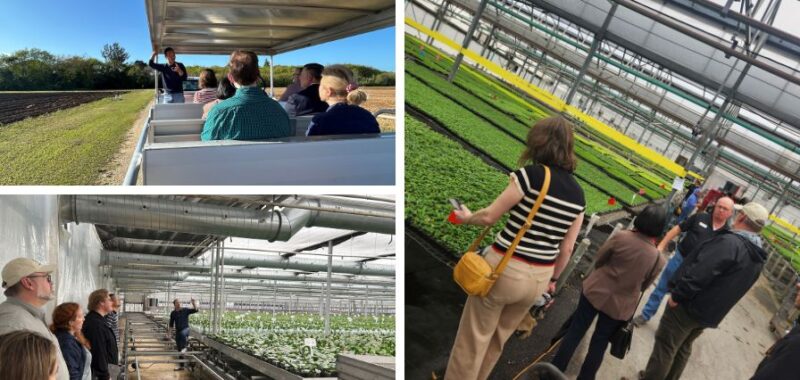
(Clockwise from top left) Xingbo Wu leading the tour, a Costa Farms visit, the Silver Vase tour. | UF/IFAS
With a $31.4 billion economic impact, Florida leads the nation in nursery production.
Miami-Dade County ranks No.1 in production nationwide, with nurseries accounting for 84% of the county’s agricultural sector, with its vast selection of grown subtropical and tropical ornamental plants like hibiscus and gardenia.
However, this thriving sector faces persistent threats from invasive insects and pests, which endanger stakeholders’ businesses and the region’s agricultural sustainability.
To address these challenges, the University of Florida hosted representatives from federal and state funding agencies and recently toured key nursery operations in the heart of Homestead in Miami-Dade County, where ornamental plants are the kings and queens of the nursery industry.
“The visit was to showcase the industry’s needs and explore solutions to sustain production and operations,” says Xingbo Wu, an Assistant Professor at the UF/IFAS Tropical Research and Education Center (TREC), specializing in tropical plant breeding and genetics. “The nursery industry holds a unique and essential place in the agricultural sector. While our tropical environment provides ideal conditions for nursery crop production, it also presents significant challenges. This industry supports numerous livelihoods and families, and it has the potential for even greater growth and success with sustainable long-term solutions.”
Among the visiting organizations were representatives from the USDA Agricultural Research Service, the American Floral Endowment, the Horticulture Research Institute, the Florida Nursery, Growers and Landscape Association’s state and Miami-Dade County Chapter, Miami-Dade County, and the Dade County Farm Bureau.
The tour included visits to Costa Farms, the largest nursery operation in the region, cultivating a diverse range of crops, and Silver Vase, a leading producer of orchids and others. These educational site visits provided firsthand insights into the challenges faced by nursery operators and the critical research support required to ensure the industry’s future resilience.

Orchids at the Silver Vase greenhouse facility. | UF/IFAS
Jeffrey DeMott, Executive Vice President of Alpha Foliage, Inc. and President of Redland Nursery, Inc., one of the visited nurseries, highlighted the industry’s greatest challenge.
“The need for research on pests and diseases is key. We need funding for more accurate and timely research primarily from our local UF/IFAS Tropical Research and Education Center,” says DeMott. “Our industry depends on this center for crucial research. Researchers have been invaluable in how we treat for Hibiscus bud weevil and Thrips parvispinus these past few years.”
DeMott stressed that with increasing pressure from invasive species and environmental factors, continued research and funding support will be essential in safeguarding South Florida’s nursery industry, a vital sector for both local and global agricultural sustainability.
“Without their research, our industry would be spending millions of more dollars on chemicals that may prove ineffective,” he says. “By investing instead in research via TREC, they provide invaluable information on the best treatment methods that we can make use of immediately in our nurseries and farms.”
Key outcomes of the visit included a recognition of the economic significance of South Florida’s nursery industry and the ongoing challenges it faces.
Participants also identified available resources to address these challenges, including research support from organizations such as the American Floral Endowment, the Horticulture Research Institute, and the USDA’s Specialty Crop Research Initiative.
The visit helped strengthen collaborations between industry stakeholders, researchers, and funding agencies. Finally, it reinforced the importance of advocating for the nursery industry at a national level to ensure its long-term sustainability and growth, says Wu. “The potential impact of these efforts will benefit all Florida nursery growers, including more than 7,000 registered nurseries,” he says. “By enabling timely responses to invasive pests and insects while promoting sustainable, long-term solutions, we are ensuring the industry’s resilience and continued success.”

